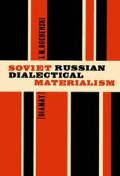Abstract
In philosophic writings the word ‘dialectic’ has four distinct meanings. First of all it refers to the art of discussion and, in Plato, to metaphysics as well; thus it acquires the meaning ‘logic’, logic of probability (with Aristotle) and logic in general (in the Renaissance); for Kant the word represents the sum of natural and nevertheless fallacious deductions; finally, Hegel defines dialectic as follows: it is “the very nature of thinking”1; as, however, with Hegel, the laws of thinking and of being coincide, dialectic is for him “the specific and true nature of rational definitions, of things and of the finite in general”.2 In other words, Hegel sees in dialectic the totality of laws which determine the evolution of being. Judin and Rozen- tal’ agree with Hegel when they declare: “The dialectic is the science of the general laws of evolution in nature, in human society and in thought.” 3 This dialectic plays an exceedingly significant part in Dialectical Materialism; Stalin calls it the “soul of Marxism”.4 Lenin, when he grew older, summoned the Soviet philosophers to study Hegel’s dialectic with zeal.
Access this chapter
Tax calculation will be finalised at checkout
Purchases are for personal use only
Preview
Unable to display preview. Download preview PDF.
Rferences
Encyclopaedia, Par. II, p. 43.
Ib. par. 81, p. 105.
KFS 60a.
Pr 316; cf. Lenin, Voprosy 247.
MEM 467.
Dial Prirody (in Russian) 125; cf. Mitin 1934, 140.
FT 211 et seq.
KFS 103a.
DM 143a; KFS 36a.
LF 52f.
Phänom. 21.
FT 125.
BAD 31; ME 165; KFS 73a.
ME 147 et seq. cf. Pr. 316a.
FT 156; KFS 219a; Pr 316a.
KFS 219a.
KFS 274a; cf. Mitin 1933, 197.
Lenin “What is to be done?”, ed. WWI, 197 et seq.; KFS 266a.
KFS 188b.
DM 144.
BSE 21, 575; KFS 59a; Pr 316a.
KFS 188a; Leonov 1947, 70, 117 et seq.
BSE 22, 183.
AD 135 et seq.; BSE 41, 616; KFS 244a.
AD 306; BSE 41, 617.
Mitin 1933, 204.
KFS 32b.
DM 143(b).
DM I45(c).
KFS 160b.
FT 148.
KFS 77.
Leonov 1947, 88.
FT 148.
Mitin 1933, 189.
FT-ME 376.
DM I44(c).
BSE 22, 155.
Leonov 1947, 140.
P. C. Trofimov, VF 1948, 1, 295a.
KFS 104b.
Encyklopaedia, Par. 99. p. 199.
KFS 112b.
AD 503. DM 145.
DM 149.
Trofimov op. cit. 294a.
AD 353.
Ya. P. Golenčenko, VF 1947, 1, 314.
KFS 250a.
DM 147.
J. Gredt: Elementa philosophiae Aristotelico-Thomisticae, Friburgi Br. 1926, 298 et seq.
DM 147.
FT-ME 375.
Ib.
Ib.
FT-ME 377.
Pr. 317b.
See, for instance, M. Rozental’ 1954, 274 et seq., 288 et seq.
On contrad. 10-39.
FT 263.
KFS 54b.
FT 211 et seq.
Dial. Prirody 125 et seq., cf. Mitin 1933,140.
Sviderskij 306a.
Trofimov op. cit. 296b.
Rights and permissions
Copyright information
© 1963 D. Reidel Publishing Company
About this chapter
Cite this chapter
Bochenski, J.M. (1963). The Dialectic. In: Soviet Russian Dialectical Materialism. Springer, Dordrecht. https://doi.org/10.1007/978-94-010-3629-0_11
Download citation
DOI: https://doi.org/10.1007/978-94-010-3629-0_11
Publisher Name: Springer, Dordrecht
Print ISBN: 978-94-010-3631-3
Online ISBN: 978-94-010-3629-0
eBook Packages: Springer Book Archive

